Community Wellness Workers
Goal: To partner Latino families with Latina community wellness workers (Promotoras de Salud) in order to create a healthier community, as well as to create a Latino allied health workforce in which promotores are recognized for their value in providing culturally relevant care within the community and the larger health system.
Objectives:
2. Tomando Control de su Salud/Taking Control of your Health
Vivir Saludable con Diabetes/Living Healthy with Diabetes:
These evidence-based programs from Stanford University aim to increase knowledge, healthy choices, preventing chronic disease (Tomando Control de su Salud/Taking Control of your Health), and self-management of diabetes (Vivir Saludable con Diabetes/Living Healthy with Diabetes) in a six-week, interactive series that teach people about their own power and shinning a light on better choices when purchasing food, and cooking. Sessions are free, snacks and childcare are provided. These sessions are offered in collaboration with Access Community Health Center with the support of the University of Wisconsin-Madison's Wisconsin Institute for Health Aging.
Objectives:
- Develop community leadership and civic engagement from the bottom-up.
- Increase Centro’s capacity to serve a wider range of community members.
- Implement programs geared to support mothers and their babies/children.
- Increase the number of wellness activities at Centro throughout the year.
- Postpartum peer support groups:
2. Tomando Control de su Salud/Taking Control of your Health
Vivir Saludable con Diabetes/Living Healthy with Diabetes:
These evidence-based programs from Stanford University aim to increase knowledge, healthy choices, preventing chronic disease (Tomando Control de su Salud/Taking Control of your Health), and self-management of diabetes (Vivir Saludable con Diabetes/Living Healthy with Diabetes) in a six-week, interactive series that teach people about their own power and shinning a light on better choices when purchasing food, and cooking. Sessions are free, snacks and childcare are provided. These sessions are offered in collaboration with Access Community Health Center with the support of the University of Wisconsin-Madison's Wisconsin Institute for Health Aging.
Meet the Promotoras de Salud (Community Wellness Workers):
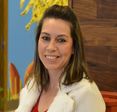
Rosalba grew up in a rural town in Zacatecas, Mexico, where she developed a love for agriculture and music. In 2001, she immigrated to the United States, and spent her first few years working in a retail shop in Chicago. She had a hard time adjusting to the urban environment of this huge city and longed for home. However, when she moved to Madison, where she was surrounded by agriculture and animals, she felt more comfortable and was reminded more of her home in Mexico. As a promotora, Rosalba wants to provide her community with the knowledge that she learns in her classes, and give them the resources that they need to feel confident in their own abilities. She touches on the personal growth that she’s experienced as a promotora, and describes the importance of remembering where she came from – “I am proud of where I came from and of my roots; it remains so important for us to talk about our origins and remember our culture.” Rosalba hopes to continue to empower her community with knowledge and with pride, and serve as an example to her son to “not forget where he came from, to be thankful for what we have and all that this country has given us, but remember who you are and do not lose that.”
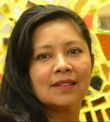
Virginia grew up in Puebla, Mexico and in 2005 she came to the United States by herself where she knew no one but her uncle. She described the loneliness and difficulty of being so far from home as isolating, not knowing anyone or understanding the language. Many times she wished to return home. She recalls the time she spent working in a restaurant, where she met a coworker that really changed her perspective and helped her with and through a lot, she refers to him as her “angelito” (angel). As a promotora, Virginia hopes to continue to help people as her “angelito” helped her. She wants her community to know about the resources available to them and to help make their transition from their community at home to one here in the states more comfortable. As a mother, Virginia wants to be an example to her children and show them the importance of a life-long education.
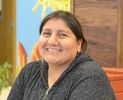
Matilde is an indigenous woman of Ecuador, she immigrated to the United States in 2001 with her husband and two small children with the dream of finding a better life. Her idea of life in the United States was one in which she had the ability to earn money for herself and her family, which she quickly found was much more difficult than it had seemed. And so she continued her work as an artisan, making and selling jewelry as she had in Ecuador. As a promotora, Matilde continues to learn and inspire her daughters and those in her community. The goal, she says, is to continue studying and to strive for knowledge regardless of the obstacles you face, because everything is possible.
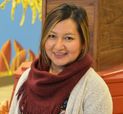
Maricela, a native to Puebla, Mexico, immigrated to the United States when she was 19, dreams and hopes for a better future. The first few years were very hard and lonely – Mari did not have a car, missed her family back home, and did not speak English. She spent most of her time working and when she had free time, she studied English and spent time with her cousins. It has been 14 years since Mari first arrived in Madison and she works with el Centro as a “Promotora de Salud”. For her, being a promotora is about more than education, it is a way in which she can empower her community by giving them a voice, and show them all of the resources available to them. Additionally, being a promotora means being an example to her three young children. She wants to teach them the importance of remembering where they came from and show them that all though they may be far from their community, they can accomplish anything.
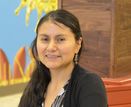
Aída is an indigenous woman of the Kichwa tribe and grew up surrounded by nature in Oatavalo, a city in the Ecuadorian Andes. She describes her first time in the US as the feeling of stepping into another planet because she had just entered a world where nobody spoke her language, dressed as she did, or had the same color of skin as she. However, she still recalls feeling full of dreams. When applying to jobs, she described her feeling of discouragement when employers looked at her traditional dress and skin and heard her foreign accent and proceeded to tell her no. And so Aída started her own business of crafts and textiles, where she is proud of who she is and continues to do work that she enjoys. However, her desire to surge forward and to learn has not wavered since she first arrived here, for the struggles she has faced and the obstacles she has overcome have shaped her into the resilient and strong woman that she is. Aída worked hard to learn English and became educated, and continues to educate herself everyday. She describes herself as a dreamer, and that her dream is to have an egalitarian society where everyone has the same rights. Her goal as a promotora is to dedicate her effort and time to her community, in order to inform and spread her knowledge of resources and alternatives that exist, so that they may resolve the different concerns and obstacles that affect the families of her community. Her duty as a promotora and as a human being is to instill knowledge in all of our people, to create a generation of children and young people who are strengthened through education. In this way, she explains, we will be creating a more educated, respectful, and compassionate mankind. She lives by the mantra that education is the door to freedom and that we should never stop learning. With these sentiments she fights for equity in her community.
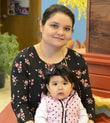
Jennifer grew up in Colombia and came to the United States in 2007 with her sister and some of her extended family. She first landed in North Carolina, where she met her husband. They then moved from North Carolina to Madison where Jennifer began working for a cleaning company, studying English, and volunteering for a non-profit organization where she learned of the Promotoras program. When Jennifer started as a promotora she was pregnant with her first baby, who was born one month later. Jennifer loves her work as a promotora because she loves to help her community and show them that there are so many resources available and so many people that wish to help them. As a mother and a promotora, Jennifer wants to create a better future for her family through education and giving back to her community.
Contacts:
Aída Inuka Jennifer Valencia Virginia López Maricela Martínez Matilde Cachiguango Rosalba Montoya
[email protected] [email protected] [email protected] [email protected] [email protected] [email protected]
|
|
"If you want to go fast, go alone. If you want to go far, go accompanied" -African proverb.
